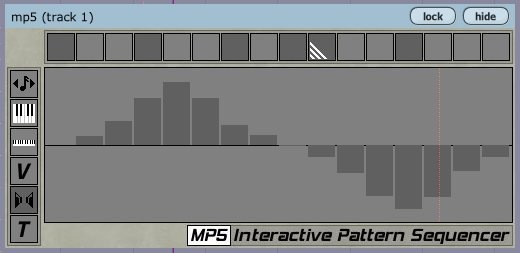Sure, what with it being 2008 and all, “plug-in” to many people means audio processing. But what if you want an arpeggiator? Or something to harmonize incoming notes, or match them to scales? Or … well, just about anything else you can do with pitch and time with MIDI, from utilities to music effects? And what if your host’s built-in options are letting you down?
The good news: you’ve got lots of options. The bad news: a lot are on Windows.
We saw Chirp, a Mac/Windows utility for assigning QWERTY keyboards to MIDI input, earlier this week. But that’s led to some other discussions.
The MVelope MIDI Toolkit includes a whole range of free MIDI plug-ins for Windows VST hosts. There’s already MKey, a very nice, mature QWERTY keyboard (similar to Chirp, but a little simpler and functioning as a plug-in). In beta or “teaser” form are some other interesting utilities: a pattern-based arpeggiator (pictured, top), filter/router, chord generator, and eventually a Control Change-powered LFO you can drop anywhere you like. (I’d love to have that last one in Ableton Live, since I miss the readily-available LFOs found in tools like FL Studio.) Thanks to Peter for the tip on this one.
But ready to jump down the rabbit hole?
MIDI Plug-ins (midiplugins.com) is an attempt to list, comprehensively, every MIDI plug-in in the universe of current software. (Yikes!) Most are simple, free utilities, and most run free on Windows. You’ll also see a list of plug-ins found in hosts like Cakewalk’s SONAR. (Thanks, Eoin!)
Why the PC bias? Unfortunately for Mac users, the PC has tended to have better support for this sort of thing. Windows has not one but two formats for MIDI processing: the favored VST format from Steinberg has long supported MIDI, and DirectX has its own “mfx” format. (The latter is less popular, but you’ll see there are still a number of handy tools.)
Mac audio developers would be more qualified than I am to describe the situation with Apple’s Audio Units format, but it appears in-line MIDI processing isn’t supported at all. (If I’m wrong, and it is, developers haven’t picked it up.) A MIDI property was apparently added to AU for Leopard, but from the description it’s still designed for processing MIDI data for an audio plug-in, not for writing MIDI plug-ins, per se.
Mac users do have one utility that makes up for this, however, and may be preferable to using plug-ins: the awesome, elegant MidiPipe, which runs independently from your host app and processes custom “pipes” of MIDI messages.
Windows users who prefer using a separate app to working with plug-ins (or want still more power), be sure to check out MIDI-OX and Bome MIDI Translator.
Oh, yeah, and on both Windows and x86 Linux, you can use KeyKit (formerly Keynote), a free programming environment for MIDI written by Tim Thompson, sometimes-CDM reader.
Bottom line: you can do a ridiculous amount with MIDI data, regardless of your choice of platforms and tools.
I know. I’m not helping. You just kicked your habit with audio software, and now you can fall down a spiraling addiction to MIDI software.
Sorry. Really.
